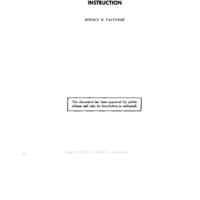-
Title
-
Effect of Confirmation Peeking and Response Mode on Programmed Instruction
-
Date
-
1968
-
Index Abstract
-
Not Available
-
Photo Quality
-
Not Needed
-
Report Number
-
AMRL TR 67-225
-
Corporate Author
-
Behavioral Sciences Laboratory
-
Laboratory
-
Aerospace Medical Research Laboratories
-
Extent
-
32
-
Identifier
-
AD0686422
-
Access Rights
-
This document has been approved for public release and sale; its distribution is unlimited
-
Distribution Classification
-
1
-
Contract
-
Laboratory Research - No Contract
-
DoD Project
-
1710
-
DoD Task
-
171003
-
DTIC Record Exists
-
No
-
Distribution Change Authority Correspondence
-
None
-
Distribution Conflict
-
No
-
Abstract
-
An experiment was conducted to determine the effect of peeking on programmed instruction. The study tested the following hypotheses: (1) the requirement for overt responses does not increase learning in programmed instruction, (2) devices or formats to preclude confirmation peeking do not increase the effectiveness of programmed instruction, and (3) time can be saved by eliminating the requirement for overt responses. Two groups of 39 subjects each were used. The subjects were commissioned officer Air Force pilot trainees and Air Force Reserve Officer Training Corps (AFROTC), junior and senior college students matched on the basis of scores obtained on the Officer Quality Composite of the Air Force Officer Qualifying Test (AFOQT). The stimulus material was a radar orientation programmed text. Results of the study were: (1) peeking did not reduce the effectiveness of programmed instruction; (2) students who responded covertly learned as efficiently as students who responded overtly; and (3) covert responding did not save instructional time.
-
Report Availability
-
Full text available
-
Date Issued
-
1968-12
-
Provenance
-
RAF Centre of Aviation Medicine
-
Type
-
report
-
Format
-
1 online resource
-
Creator
-
Valverde, Horace H.
 AMRLTR67-225.pdf
AMRLTR67-225.pdf